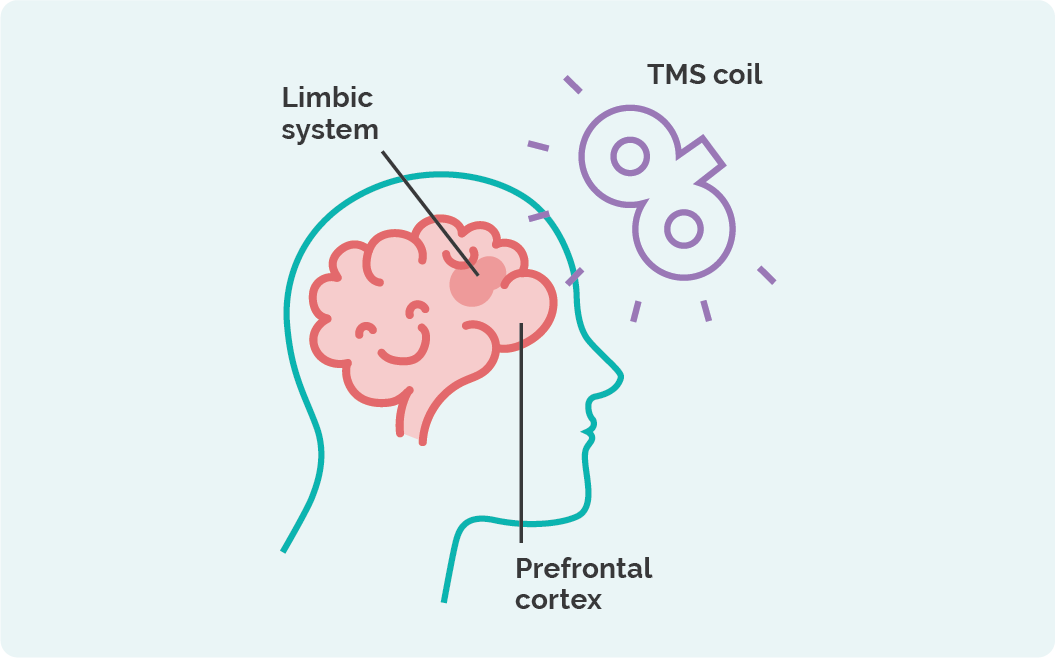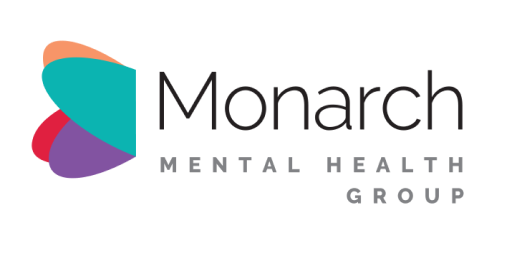rTMS is now MBS subsidised for eligible patients.
Repetitive transcranial magnetic stimulation (rTMS)
A repetitive transcranial magnetic stimulation system (rTMS), also called intermittent theta-burst stimulation, provides a non-invasive treatment for various mental health conditions. It is a brain stimulation therapy that offers a safe and effective alternative for individuals who haven't found relief through traditional medications or therapy. At Monarch Mental Health Group (MMHG), we utilise cutting-edge rTMS technology to help patients overcome treatment-resistant depression, anxiety, and other mental health conditions.
What is rTMS?
rTMS uses short magnetic pulses to stimulate specific areas of the brain associated with mood regulation. During treatment, a magnetic coil is placed near your scalp, delivering painless pulses that activate or inhibit nerve cell activity. This targeted magnetic stimulation aims to normalise brain function and alleviate symptoms of various mental health conditions.

What Mental Health Conditions Can rTMS Treat?
-
Depression
rTMS magnetic stimulation has been extensively studied and proven effective for treating depression and major depressive disorder (MDD), especially when traditional methods haven't yielded satisfactory results. -
Obsessive-Compulsive Disorder (OCD)
Repetitive transcranial magnetic stimulation offers promising results for reducing OCD symptoms, particularly when this noninvasive brain stimulation therapy is targeted at specific brain regions involved in compulsive behaviors. -
Anxiety Disorders
Studies suggest repetitive transcranial magnetic stimulation can be beneficial in managing anxiety disorders, including generalised anxiety disorder and social anxiety disorder. -
Other Mental Health Conditions
Research is ongoing to explore the potential benefits of repetitive transcranial magnetic stimulation for treating other mental health conditions, such as PTSD, chronic pain, bipolar disorder, and tinnitus.
Benefits of Repetitive Transcranial Magnetic Stimulation Treatment
-
Non-invasive and painless
Unlike surgery or deep brain stimulation, repetitive transcranial magnetic stimulation is a non-invasive procedure that doesn't require anesthesia or hospitalisation. The brain stimulation process is generally well-tolerated, with minimal side effects. -
Targeted treatment
Repetitive transcranial magnetic stimulation can specifically target brain regions implicated in the symptoms, offering a more focused approach than medications that affect the entire brain. -
Fewer side effects
Compared to medications, rTMS has a lower risk of side effects, making it a suitable option for individuals who cannot tolerate medications or experience significant side effects. -
Long-lasting effects
While results may vary, some patients experience sustained improvement in anxiety and depression symptoms even after treatment ends. -
Can be used with other mental health therapies
rTMS brain stimulation therapies can be combined with psychotherapy and medication management for a more comprehensive treatment approach.
How Does rTMS Work?
Repetitive transcranial magnetic stimulation is an effective, non-invasive, treatment proven to treat various conditions, including major depression, anxiety, and OCD. The magnetic pulses stimulate nerve cells in the targeted brain region, leading to changes in their activity and communication patterns. This can normalise brain function and alleviate symptoms associated with various mental health conditions.
rTMS is particularly effective for depression as this noninvasive brain stimulation therapy has been found to be more effective than antidepressants or other alternatives for those with treatment-resistant depression.
In 1995, pilot clinical trials suggested that repetitive transcranial magnetic stimulation produced antidepressant benefits as a vast majority showed a benefit of rTMS therapy over sham stimulation. In 2017, in a study including 81 rTMS clinical trials, with a total of 4233 patients, different forms of rTMS were all found to be more effective than sham stimulation for both response and remission rates.
Sackeim 2020 study describes the outcomes of 5010 patients treated at 103 practices at both intention-to-treat basis (ITI) and for treatment completers who had received at least 20 rTMS sessions. Response and remissions rates were 58% and 28% in the ITI group and 83% and 62% in patients completed at least 20 treatments. It is necessary to note that the vast majority of trials demonstrating the effectiveness of rTMS have been conducted with patients with significant levels of treatment-resistant depression. On average, of over 1100 patients, we found a response rate of over 45% in a group of patients who averaged more than 5.5 failed medication trials.
Transcranial: Passing through the skull
Direct Current Stimulation: Directing an electrical current to stimulate specific parts of the brain
Neuromodulation: Altering nerve activity in the brain by delivering treatment to a specific area.
How Effective is Repetitive Transcranial Magnetic Stimulation?
Research indicates that rTMS is a promising treatment for depression, with studies showing significant improvement in symptoms for many patients as the therapy works to stimulate nerve cells. The effectiveness can vary based on the individual and the specific condition being treated. At Monarch Mental Health Group, we will discuss your specific situation and potential outcomes during the consultation process.
| Real-World Study | RCT Meta-Analysis | The Monarch Clinic Australia | |
| 5,010 TMS treated patients (103 sites)* | 1132 TMS Treated Australian Patients** | 130 TMS Treated patients*** | |
| Response | 58% | 47% | 55% |
| Remission | 28% | 31% | 34% |
*Response and remission assessed using Patient Health Questionnaire 9 (PHQ 9( and/or the Clinical GLobal Impression - Severity Scale (CGI-S)
**Response and remission assessed using HAMD-MADRS
***Response and remission assessed using QIDS-CR
RCT: Randomised COntrolled Trial
Who is a Good Candidate for rTMS?
Repetitive transcranial magnetic stimulation may be an option for individuals who:
- Have experienced treatment-resistant depression, obsessive compulsive disorder, anxiety, or another qualifying mental health condition
- Cannot tolerate or experience significant side effects from medications
- Are seeking an alternative treatment approach alongside therapy
Public funding like Medicare stipulates that patients must have trialled 2 or more classes of antidepressants before qualifying to be MBS subsidised. Therefore those who tried and failed 2 or more antidepressants or those considering ECT for their severe depression should consider repetitive transcranial magnetic stimulation as a viable option.
The rTMS Process at Monarch Mental Health Clinics
Initial Consultation
During the initial consultation, a psychiatrist at MMHG will thoroughly assess your medical and psychiatric history. They will discuss your symptoms, treatment history, and any current medications you are taking. This comprehensive evaluation will determine if rTMS or other brain stimulation therapies are a suitable treatment option for you.
Treatment Planning
If repetitive TMS is deemed appropriate, our team will develop a personalised treatment plan tailored to your specific needs. This plan will outline the targeted brain region, the number of treatment sessions, and the frequency of stimulation.
Treatment Sessions
Repetitive TMS sessions typically last 30-60 minutes and are performed on an outpatient basis. You will be comfortably seated in a chair while the magnetic coil is placed near your scalp. You may experience a tapping sensation on your head during the session.
Monitoring and Follow-up
Our team will closely monitor your progress throughout the treatment and adjust the plan as needed. Following the treatment course, follow-up appointments will be scheduled to monitor your long-term response and overall mental health.

Taking Control of Your Mental Health
If you're struggling with treatment-resistant depression, anxiety, or other mental health conditions, repetitive TMS may offer a new path to recovery. At Monarch Mental Health Group, our experienced team is dedicated to providing you with personalised care and cutting-edge repetitive transcranial magnetic stimulation therapy. If you wish to claim session costs back via Medicare rebate, you must have a referral from your GP (including a current Mental Health Care Plan) or psychiatrist.
Contact us today to schedule a consultation and discuss if repetitive TMS is right for you.
Frequently Asked Questions About TMS
No, repetitive TMS is a painless procedure. You may experience a tapping sensation on your head during the session, but it is generally well-tolerated.
The number of sessions needed will vary depending on the individual and the condition being treated. Typically, a course of brain stimulation treatment involves daily sessions for several weeks.
Some patients may experience mild and temporary side effects following rTMS sessions, such as:
- Headaches: This is the most common side effect of magnetitic stimulation and can usually be managed with over-the-counter pain relievers.
- Scalp discomfort: You may feel a tingling or tapping sensation on your scalp during the transcranial magnetic stimulation session. This typically subsides shortly after the treatment.
- Lightheadedness: Some individuals may experience brief disziness following a session, which usually resolves quickly.
It's important to report any side effects you experience to your doctor at MMHG. Our team will monitor your well-being throughout the repetitive transcranial magnetic stimulation treatment and adjust the settings if necessary to minimise any discomfort.
The timeframe for experiencing results from repetitive transcranial magnetic stimulation can vary depending on the individual and the condition being treated. Some patients may begin to feel improvement within a few weeks, while others may take several weeks or even months to experience the full benefits.
Insurance coverage for repetitive transcranial magnetic stimulation can vary depending on your specific plan. We recommend contacting your insurance provider to determine your coverage details. If you wish to claim session costs back via Medicare rebate, you must have a referral from your GP (including a current Mental Health Care Plan) or psychiatrist.
Following the repetitive transcranial magnetic stimulation treatment course, we will schedule follow-up appointments to monitor your long-term progress and overall mental health. Maintaining healthy lifestyle habits and potentially continuing with therapy can help sustain the positive effects of rTMS treatment.

